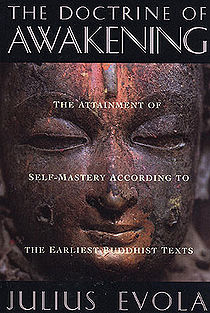
The Doctrine of Awakening
Encyclopedia

Julius Evola
Barone Giulio Cesare Andrea Evola also known as Julius Evola, was an Italian philosopher and esotericist...
. First published in Italian
Italian language
Italian is a Romance language spoken mainly in Europe: Italy, Switzerland, San Marino, Vatican City, by minorities in Malta, Monaco, Croatia, Slovenia, France, Libya, Eritrea, and Somalia, and by immigrant communities in the Americas and Australia...
as La dottrina del risveglio in 1943. It was translated into English
English language
English is a West Germanic language that arose in the Anglo-Saxon kingdoms of England and spread into what was to become south-east Scotland under the influence of the Anglian medieval kingdom of Northumbria...
in 1948 by H.E. Musson
Nanavira Thera
Ñāṇavīra Thera born Harold Edward Musson was an English Theravāda Buddhist monk, ordained in 1950 in Sri Lanka...
, and republished in 1997 (ISBN 0-89281-553-1).
Table of Contents
- Translator's Foreword
- Preface
- Introduction
- Part I: Principles
- 1. Varieties of Ascesis
- 2. The Aryan-ness of the Doctrine of Awakening
- 3. The Historical Context of the Doctrine of Awakening
- 4. Destruction of the Demon of Dialectics
- 5. The Flame and SamsaricSamsarathumb|right|200px|Traditional Tibetan painting or [[Thanka]] showing the [[wheel of life]] and realms of saṃsāraSaṅsāra or Saṃsāra , , literally meaning "continuous flow", is the cycle of birth, life, death, rebirth or reincarnation within Hinduism, Buddhism, Bön, Jainism, Sikhism, and other...
Consciousness - 6. Conditioned Genesis
- 7. Determination of the Vocations
- Part II: Practice
- 8. The Qualities of the Combatant and the "Departure"
- 9. Defense and Consolidation
- 10. Rightness
- 11. Sidereal Awareness: The Wounds Close
- 12. The Four Jhana: The "Irradiant Contemplations"
- 13. The States Free from Form and the Extinction
- 14. Discrimination Between the "Powers"
- 15. Phenomenology of the Great Liberation
- 16. Signs of the Nonpareil
- 17. The Void: "If the Mind Does Not Break"
- 18. Up to ZenZenZen is a school of Mahāyāna Buddhism founded by the Buddhist monk Bodhidharma. The word Zen is from the Japanese pronunciation of the Chinese word Chán , which in turn is derived from the Sanskrit word dhyāna, which can be approximately translated as "meditation" or "meditative state."Zen...
- 19. The Ariya Are Still Gathered on the Vulture's Peak
- Index
External links
- Review of The Doctrine of Awakening by Richard Smoley in Parabola magazineParabola (magazine)Parabola: Where Spiritual Traditions Meet, whose founder and editor was D.M. Dooling, began publishing in 1976 as a quarterly magazine on the subjects of mythology and the world's religious and cultural traditions. It is published by The Society for the Study of Myth and Tradition, a not-for-profit...
. - Publisher's blurb for The Doctrine of Awakening by Inner Traditions
- Discussion on The Doctrine of Awakenings translator: Captain Harold MussonNanavira TheraÑāṇavīra Thera born Harold Edward Musson was an English Theravāda Buddhist monk, ordained in 1950 in Sri Lanka...

